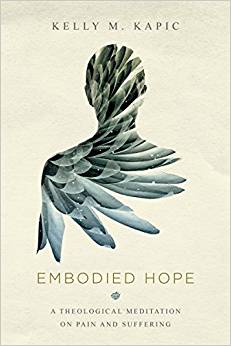
Kelly M. Kapic
Reviewed by: Jeffrey B. Wilson
Embodied Hope: A Theological Meditation on Pain and Suffering, by Kelly M. Kapic. InterVarsity, 2017. Paperback, 197 pages, $14.32 (Amazon). Reviewed by OP pastor Jeffrey B. Wilson.
In order to give Christian care to someone who is suffering, one must find a way through therapeutic vacuity and theological-philosophical pat answers. Kelly Kapic in his book invites the reader into a conversation about the incarnation of Jesus Christ. He wends the reader through a discussion of stoicism, achievement-driven goals, triumphalism, distorted expectations of our health, disregard of our finitude, a fractured view of what a human being is, and a more nuanced understanding of the effect of sin on our well-being. Of particular concern is the tendency for Christians to minimize Christ’s humanity—his weakness, hunger, fatigue, pain, suffering, etc. The assumption often is that he externally carried our brokenness, but, according to Kapic, Jesus absorbed it in order to redeem it. By way of the incarnation, God enters into our fallen humanity.
The title gives it away, but throughout Kapic’s conversation the incarnation must be kept in mind. Incarnational thinking, he argues, is essential for the Christian undergoing chronic pain and suffering as well as for the church’s care for that person. I believe he is right about this. The incarnation, the Word becoming flesh, cannot be reduced to a concept or explanation, nor is it shallow and trite. The incarnate One is divine presence, mystery, redemption, and meaning altogether. Jesus Christ took up our pain and suffering in solidarity with us, but not just so he could experience what we experience. The incarnation of Christ is a redemptive solidarity. The words of Irenaeus come to mind, “Wherefore also he passed through every stage of life, restoring to all communion with God.”
Kapic concludes his book with some wisdom for the church, because when we think incarnationally, the community of Christ has a place. “Our brothers and sisters in Christ are the means of a grace that I cannot channel to myself, namely, the physical presence of someone who is not me” (141). With the popularity of being a Christian “on my own” or with a few close friends, we must come back to the ways God mediates his grace to us. One of those ways is the fellowship of the church. For Kapic, the communion of the church allows for the much-needed practice of “confession.” Other Christians are helpful—I would say vital—for confession. Here confession is understood more broadly as confession of what is wrong and what must be made right by God. We are broken by sin, and that sin ruins life in this world. In many ways, we delude ourselves about sin, suffering, and pain. Therefore, having another member of Christ’s body hear our confession brings the gospel in an experiential way into our lives. This kind of confession requires Christians with the maturity to listen and bear mutual witness to the brokenness in the sufferer’s life but also to express the forgiveness and grace of Christ in the midst of pain.
November 16, 2025
November 09, 2025
November 02, 2025
October 26, 2025
October 19, 2025
October 05, 2025
Raising Sexually Faithful Kids and
Parenting Boys and Girls in a Gender-Confused World
September 28, 2025
© 2025 The Orthodox Presbyterian Church